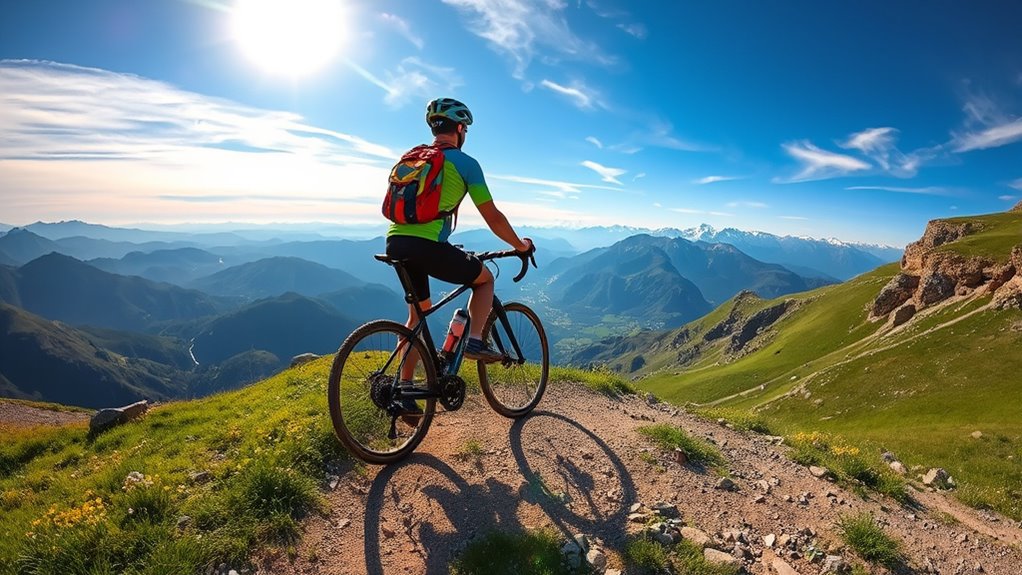Cycling around the world takes you through diverse cultures, challenging terrains, and unexpected adventures. You’ll connect with locals, share stories, and face weather, mechanical issues, and language barriers along the way. Each milestone boosts your resilience, teaches patience, and builds confidence. Solo rides offer self-discovery, while group tours foster camaraderie. With every obstacle, you learn valuable lessons about adaptability. Keep exploring, and you’ll uncover even more inspiring stories from global cyclists who have navigated similar journeys.
Key Takeaways
- Personal stories highlight resilience, cultural exchanges, and unexpected challenges faced during global bike tours.
- Encounters with locals and fellow cyclists foster meaningful connections and deepen cultural understanding.
- Navigating weather, terrain, and mechanical issues teaches adaptability and problem-solving skills.
- Celebrating milestones and overcoming setbacks promote motivation and personal growth.
- Respecting local customs and cultural differences enhances positive interactions and enriches the travel experience.
Meeting Diverse Cultures on Two Wheels
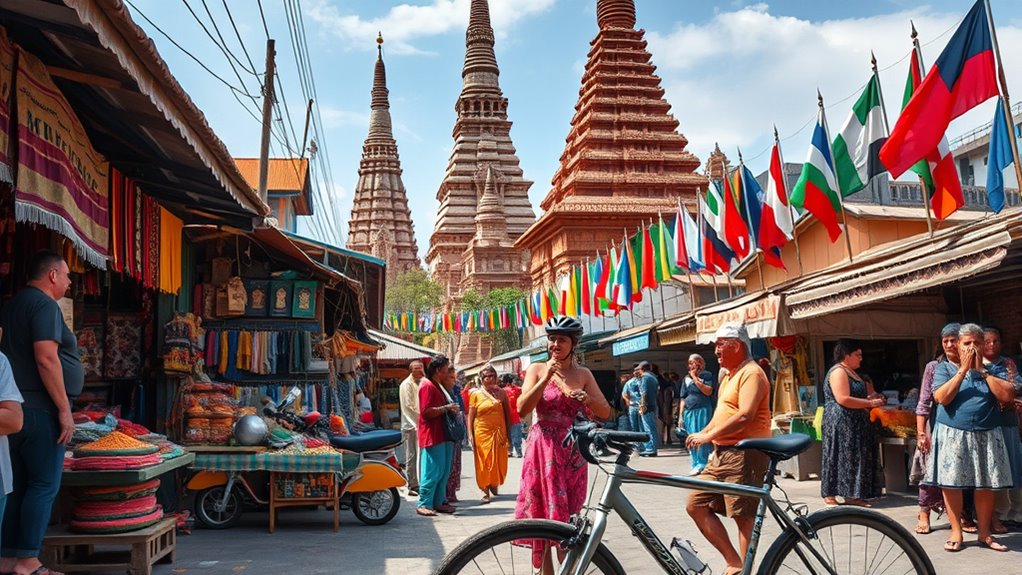
As you cycle through different regions, you’ll quickly realize that each culture has its own unique stories, traditions, and customs. These cultural exchanges happen naturally as you interact with locals, offering you a closer look at their way of life.
Embracing local traditions becomes part of your journey, whether it’s sharing a meal, participating in a festival, or learning a traditional craft. Each encounter enriches your understanding and deepens your appreciation for the diversity around you. Learning about cultural practices can also provide insight into how communities preserve their identity and adapt to change.
Your bike becomes a bridge, connecting you to communities and opening doors to authentic experiences. These moments of cultural exchange leave lasting impressions, reminding you that traveling isn’t just about reaching a destination but about immersing yourself in the vibrant tapestry of human life. Additionally, engaging with community resilience can reveal how local populations adapt to environmental and social challenges, enriching your cultural understanding.
In addition, understanding the local self watering plant pots can help you better appreciate how different cultures manage their gardening and environmental practices, enriching your overall cultural experience. Furthermore, cultural diversity influences many aspects of local life, including innovative gardening techniques and sustainable practices. Recognizing these environmental adaptations can offer valuable lessons for sustainable living worldwide.
Overcoming Challenging Terrain and Weather
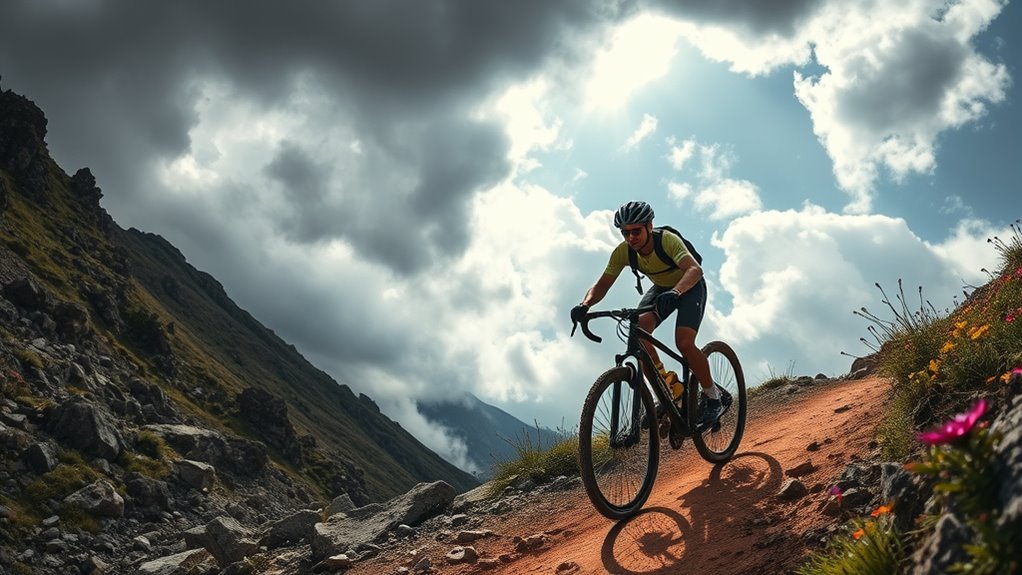
Conquering challenging terrain and unpredictable weather is a crucial part of any long-distance cycling adventure. Weather obstacles like rain, wind, or extreme heat test your resilience, while rough terrains demand skill and strength. Properly incorporating cozy textiles such as moisture-wicking clothing and thermal layers can make a significant difference in maintaining comfort and safety during adverse conditions. To overcome these challenges:
- Prepare your gear with weather-resistant clothing and reliable tires.
- Study the route to anticipate rough terrains and plan for rest stops, especially in areas with diverse ecosystems and volcanic landscapes like the Big Island, HI. Being aware of wind turbine technology can also help you stay informed about sustainable energy sources that power remote communities you may encounter.
- Adjust your pace according to weather conditions and terrain difficulty.
- Stay flexible—be ready to change plans if weather worsens or terrain becomes dangerous. Additionally, understanding juice detox principles, such as proper preparation and pacing, can help maintain your energy levels during demanding segments of your journey.
Unforgettable Encounters With Fellow Travelers
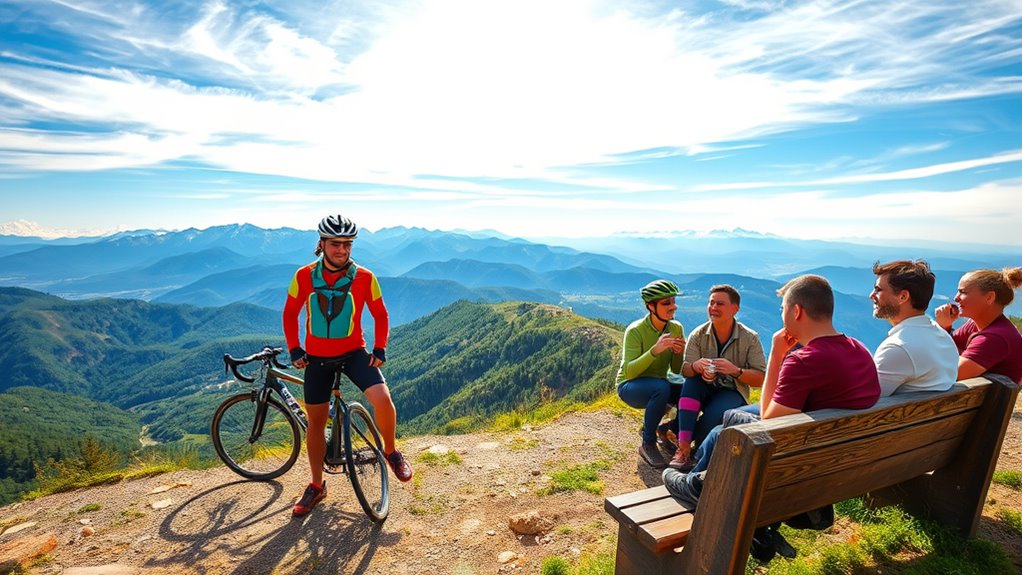
After facing tough terrains and unpredictable weather, the journey often leads to unexpected connections with fellow travelers. These encounters become the highlights of your trip, sharing stories over local cuisine or exploring scenic routes together. You might meet a cyclist from a distant country, exchanging tips and laughter as you steer through unfamiliar terrain. Sometimes, a shared meal reveals cultural nuances, creating bonds beyond language barriers. These moments remind you that cycling isn’t just about the destination but the people you meet along the way. Building trust and camaraderie with fellow adventurers enhances the experience and often leads to lifelong friendships. Engaging in these social interactions can also be influenced by your awareness of privacy policies and cookie preferences, which help ensure a comfortable and secure environment for all travelers. Moreover, understanding accommodation options along your route can facilitate more meaningful connections, making each encounter even more memorable. Recognizing the importance of professional gear can also improve safety and comfort during these journeys.
Navigating Language Barriers and Local Customs
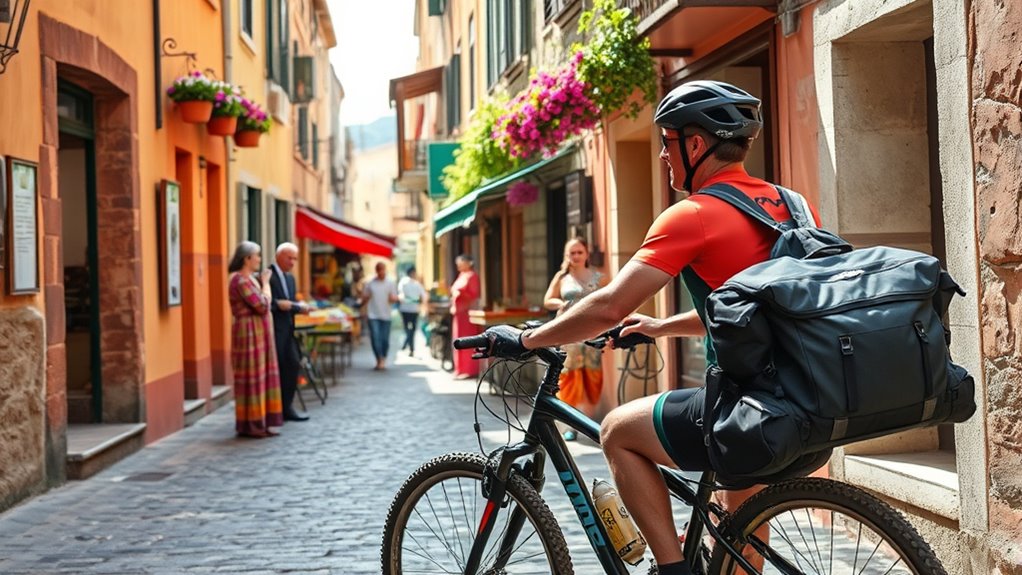
Managing language barriers and local customs can be challenging, but approaching these situations with curiosity and respect makes a big difference. To navigate effectively, try these strategies:
- Learn basic phrases in the local language; even simple greetings show respect.
- Use gestures or visual aids to communicate when words fail.
- Observe local customs carefully; small gestures like removing shoes or bowing can go a long way. Being aware of regional flavors and traditions helps deepen your understanding and appreciation of the local culture.
- Ask locals politely if you’re unsure about traditions or social norms.
- Familiarize yourself with cultural sensitivities to avoid unintended offenses and show genuine respect. Recognizing local taboos can also prevent uncomfortable situations and foster trust.
Facing Unexpected Mechanical Issues
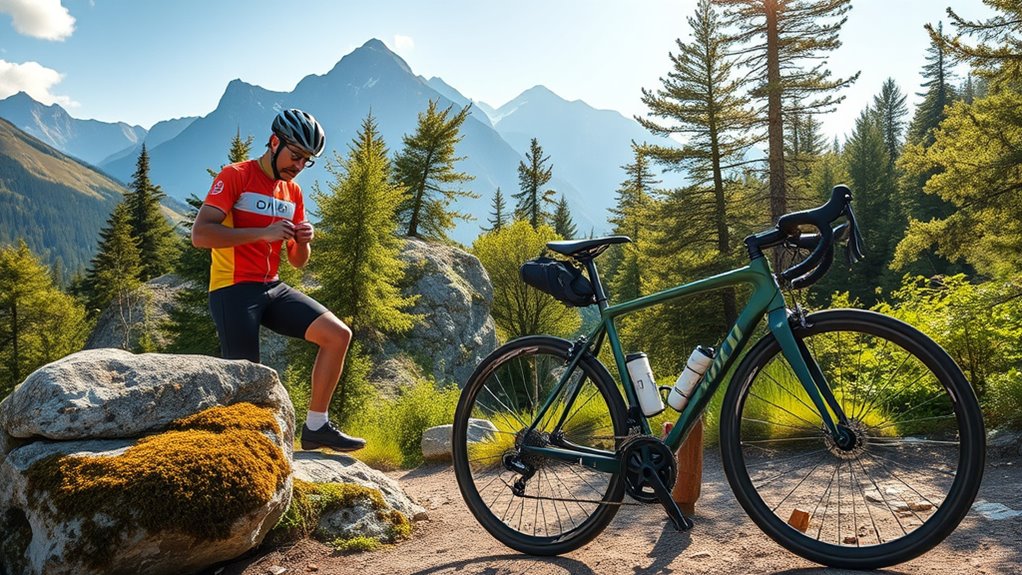
Unexpected mechanical issues can strike at any moment, often when you least expect them. Staying on top of bike maintenance is vital, but sometimes problems still occur. Carrying essential spare parts, like tubes, chain links, or brake pads, can save the day.
When your bike breaks down, stay calm and assess the problem quickly. Use your knowledge of bike maintenance to troubleshoot—tightening bolts, fixing a flat, or adjusting brakes. Having the right spare parts handy means you can often repair minor issues on the spot, avoiding lengthy delays. Maintaining your bike properly can also help prevent many common mechanical problems before they happen. Regular inspections and preventative bike maintenance are essential to reduce the likelihood of unexpected breakdowns. Additionally, understanding IRA investment strategies can help you plan financially for potential repairs or replacements during your travels.
It’s also helpful to familiarize yourself with basic repairs before your trip. Being prepared for mechanical setbacks ensures you stay moving, keeps frustration at bay, and gets you back on your journey faster.
Celebrating Personal Milestones and Achievements
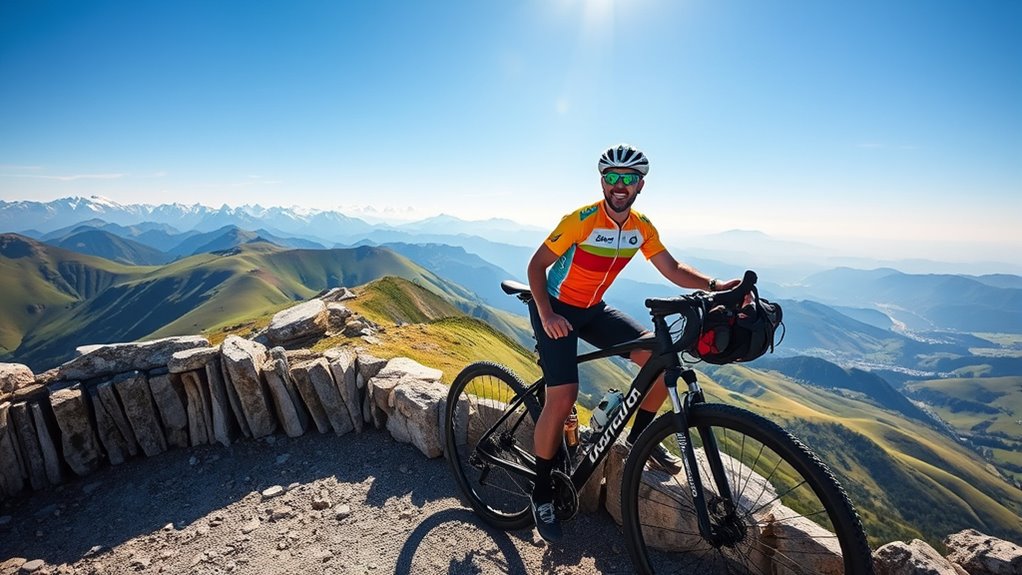
Reaching a personal milestone during your journey is a powerful reminder of your progress and resilience. It highlights your personal growth and the importance of goal setting along the way. A new sentence with recognition and celebration and the rest of the sentence. Celebrating these achievements fuels your motivation and deepens your connection to your journey. Here are some ways to honor your milestones:
Reaching milestones reminds us of progress, resilience, and the importance of celebrating personal growth along the way.
- Reflect on your accomplishments and write about your experiences.
- Share your success with fellow cyclists or friends for encouragement.
- Treat yourself to something special as a reward.
- Set new, meaningful goals that challenge you further.
Recognizing these moments reinforces your resilience and reminds you of how far you’ve come. Every milestone marks a step forward in your adventure, strengthening your confidence and inspiring continued growth. Incorporating self-reflection can help you gain deeper insights into your journey and motivate you to pursue new challenges. Additionally, acknowledging personal achievements can boost your sense of fulfillment and encourage sustained perseverance. Recognizing and celebrating progress can further enhance your sense of accomplishment and keep you motivated on your path.
The Impact of Solo vs. Group Cycling Expeditions
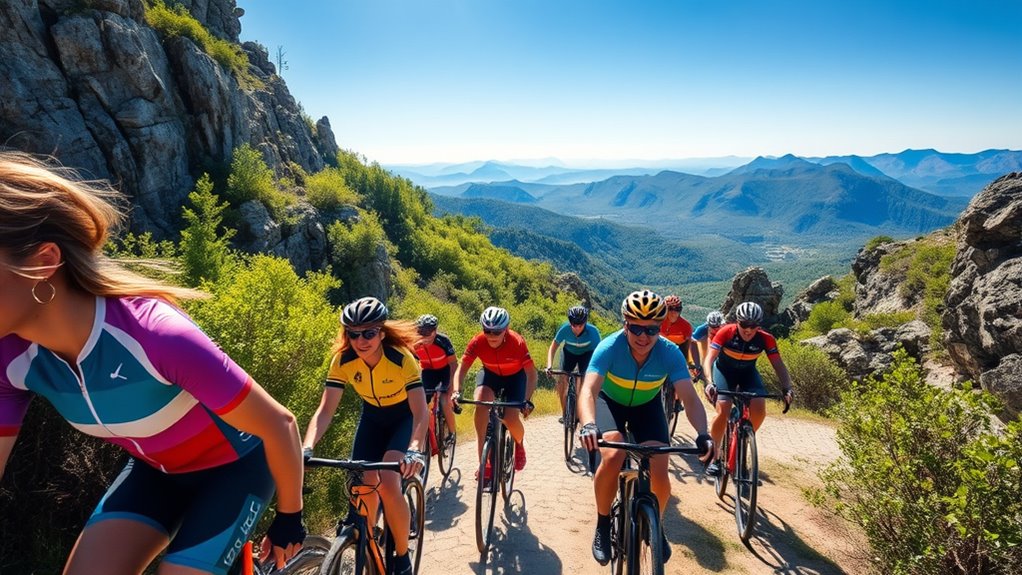
When choosing between solo and group cycling, you’ll notice differences in independence and challenge. Riding alone tests your self-reliance.
Group trips offer social support and shared experiences. Consider how these dynamics influence your journey and personal growth.
Independence and Challenge
Choosing between solo and group cycling expeditions fundamentally shapes the sense of independence and the challenges you’ll face. Solo rides demand strong self-reliance, pushing you to depend solely on your skills and judgment. They also test your mental strength, as you navigate unfamiliar terrain without support.
Conversely, group rides can ease some burdens but challenge your ability to adapt and cooperate.
- Solo cycling enhances self-reliance, requiring you to solve problems independently.
- Group riding fosters teamwork but still tests your adaptability.
- Solo trips demand resilience, especially during tough moments.
- Group rides provide shared motivation but may limit personal growth.
Ultimately, your choice influences how you develop independence and conquer challenges on your journey.
Social Dynamics and Support
The social dynamics and support systems you encounter differ dramatically between solo and group cycling expeditions. When riding solo, you rely heavily on your internal resilience and the brief interactions with locals. These interactions can foster a sense of community building but may lack consistent emotional support.
In contrast, group tours offer built-in camaraderie, where shared experiences create strong bonds and opportunities for mutual encouragement. The emotional support from fellow cyclists helps you navigate tough days and setbacks, making challenges more manageable.
Group dynamics foster a sense of belonging, often transforming solo adventures into collective journeys. Whether you seek independence or companionship, understanding these social nuances shapes your experience and influences how you connect with the places and people along your route.
Lessons Learned From the Open Road
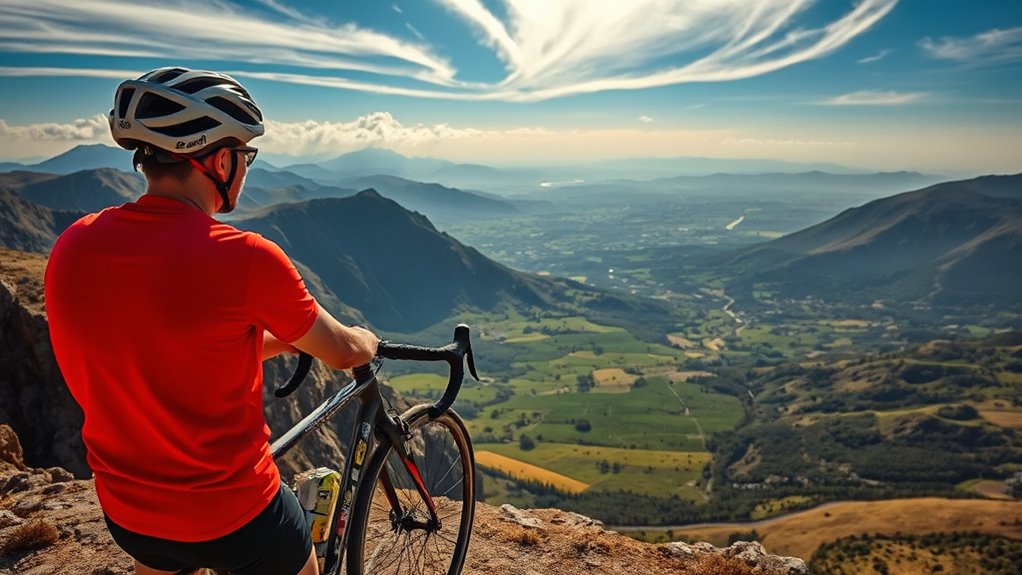
As you travel, you’ll face unexpected challenges that test your patience and problem-solving skills.
Steering through cultural differences teaches you respect and adaptability, while building resilience helps you stay motivated through tough moments.
These lessons shape your mindset and prepare you for whatever lies ahead on the open road.
Embracing Unexpected Challenges
When you hit an unexpected storm or face a sudden mechanical failure, it becomes clear that embracing challenges is part of the journey. These moments test your resilience and adaptability.
To handle surprises effectively, consider these lessons:
- Stay calm and assess the situation quickly.
- Keep your gear maintenance kit handy for quick repairs.
- Adjust your route planning on the fly to avoid worsening conditions.
- Use setbacks as learning opportunities for future trips.
Navigating Cultural Differences
Have you ever encountered a cultural difference that caught you off guard during your journey? Managing cultural differences requires paying close attention to local traditions and cultural etiquette. What’s polite in one country might be offensive in another, so observing how locals interact, greet, and respect their customs is essential.
For example, some cultures value direct eye contact, while others see it as intrusive. Respecting local traditions shows your appreciation and helps build trust. When unsure, it’s okay to ask politely or observe others’ behavior.
This awareness not only enriches your experience but also prevents misunderstandings. Embracing these differences deepens your connection with the places you visit, making your journey more authentic and respectful.
Being adaptable and open-minded is key to successfully managing cultural differences on your cycling adventure.
Building Resilient Mindsets
Long stretches on the open road test your mental toughness and push you to develop a resilient mindset. You learn to stay calm amid setbacks and adapt quickly to changing conditions.
Building mental resilience involves:
- Embracing challenges as growth opportunities, not obstacles.
- Developing flexibility to adjust plans without losing focus.
- Cultivating patience during delays or rough terrain.
- Maintaining confidence despite setbacks or fatigue.
These experiences strengthen your adaptability skills, enabling you to handle unpredictable situations with composure. Each challenge on the road becomes a lesson in perseverance, teaching you to trust your abilities and stay committed.
Over time, this resilience becomes part of your mindset, making you more prepared for whatever the journey throws your way.
Frequently Asked Questions
How Do Cyclists Secure Travel Insurance for International Trips?
When securing travel insurance for international trips, you should compare policies that cover cycling activities, medical emergencies, and border protocols.
Check if the insurance includes coverage for bike repairs or theft. Make sure it’s valid in all countries you’ll visit.
Contact providers directly or use online comparison tools.
Always read the fine print to guarantee you’re protected during border crossings and unexpected events on your cycling adventure.
What Are Essential Safety Tips for Solo Bike Travelers?
When cycling solo, prioritize safety by always wearing proper safety gear like helmets and reflective clothing.
Plan your route carefully, sticking to well-traveled roads and avoiding risky areas.
Share your route with someone trusted and keep emergency contacts handy.
Stay alert to your surroundings, carry a basic repair kit, and hydrate regularly.
How Do Cyclists Handle Visa and Border Crossing Procedures?
Imagine your journey as a storybook, with each border crossing a new chapter. You handle visa and border procedures by staying organized, keeping your passport stamps and documents ready.
Research border regulations beforehand to avoid surprises, and be patient and respectful with officials. This way, your adventure flows smoothly, transforming potential hurdles into mere pages in your global story, leaving you free to enjoy the ride ahead.
What Gear Is Recommended for Long-Term Bike Touring?
When preparing for long-term bike touring, you need a solid packing list that covers essentials like durable clothing, tools, and snacks. Focus on lightweight, versatile gear to save space.
Keep your bike maintenance kit handy for repairs on the go, including spare tubes, a pump, and multi-tools.
Prioritize comfort and practicality, ensuring you’re ready for different terrains and weather conditions, so your journey stays smooth and enjoyable.
How Do Cyclists Manage Nutrition and Hydration on Extended Rides?
Many believe cyclists naturally manage nutrition and hydration on long rides, but research shows careful planning enhances endurance.
You should focus on meal planning to guarantee balanced energy, including carbs and protein, and adopt hydration tactics like frequent water intake and electrolyte drinks.
Conclusion
As you reflect on these stories, one thing’s clear: cycling around the world transforms you in ways you never imagined. You’ll face challenges, meet incredible people, and discover strengths you didn’t know you had. So, are you ready to embrace the open road and create your own unforgettable adventure? Remember, every mile brings new lessons and memories—so gear up and start pedaling toward your dreams. The world is waiting for your story.
